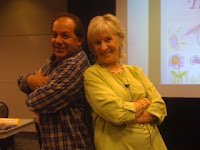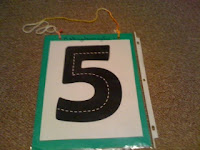“In life it’s not about waiting for the clouds to
pass over –
it’s about dancing in the rain.”
Sure, there are economic troubles in California,
but the teachers there proved that they are going to keep on dancing, and
singing, and making this a better world for children!
Last week I was invited to present at the Rainbows
Conference in Ontario, CA.
WOW! It was like going to a
rock concert with Greg and Steve.
I’ve been following that dynamic duo for 30 years, and they are just as
enthusiastic, entertaining, and fun loving as ever!!!
I met so many wonderful teachers including Miguele
Montagnetti. He wanted a picture
of us with “an attitude.” He also
taught me a new dance version to go with “Bubble Gum.” First, you draw an imaginary line on
the floor:
Bubble (Jump forwards over the imaginary line.)
Gum (Jump backwards over the line.)
Chewy chewy chewy (Boogey down.)
Chewy bubble gum. (Boogey up.)
Bubble (Jump over the imaginary line.)
Gum (Jump back over the line.)
Chewy chewy chewy (Boogey down.)
Chewy bubble gum. (Boogey up.)
I love it!
(Throw arms up in the air.)
I love it!
(Throw arms up in the air.)…
Angler Snipes shared a song to the tune of “Twinkle
Little Star” to sing when you’re potty training:
Tinkle, tinkle in the potty.
Let’s go in the potty now.
No pull ups or diapers any more.
When you go potty, pull your undies to the floor.
Tinkle, tinkle in the potty.
I’m not a baby any more!
On Monday I shared with some more fantastic
teachers on Oxnard.
Jennifer Klein gave us a great idea for helping
children speak in a complete sentence.
She wrote a capital “I” on an index card and taped it to a cylinder
block to make an “I Phone.” The
children pass this around and say sentences beginning with “I…” Only the person with the “I” phone can
talk.
Veronica Binkley told me about a game she plays
called “Clean the Table.” You can
adapt this game for any skill you want to repeat. Take paper plates and write letters, numerals, words, etc.
on them. Spread these out on a table.
One child at a time tries to “clean the table” by picking up plates and
identifying the information. Give
them 30 seconds and record their score.
Keep practicing and watch their scores improve.
And, here’s one more idea from Kathy Wadley. It’s called “I Spy.” Kathy has the children close their eyes
as she hides flash cards around the room.
(Letters, math facts, words, etc.)
The children hunt for the flash cards and bring them to her one at a
time. They must identify the
information on their cards before they continue on their hunt. Talk about easy and fun!!!!
On the road again to Troy, New York, today! Who knows what treasures I’ll find
there! That’s what keeps my job so
exciting. I keep learning new
things from YOU! Thanks!


































